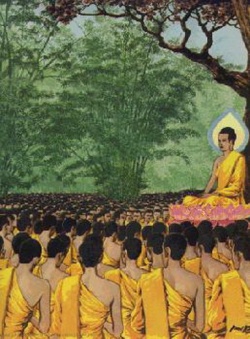Difference between revisions of "Madhupiṇḍika Sutta"
| Line 2: | Line 2: | ||
[[Madhupindika Sutta]] | [[Madhupindika Sutta]] | ||
| − | + | {{Wiki|Dandapāni}} meets the [[Buddha]] at the [[Mahāvana]] near [[Kapilavatthu]] and questions him as to his {{Wiki|tenets}}. The [[Buddha]] explains that his {{Wiki|tenets}} are such that they avoid all strife and make a man dwell above all [[pleasures]] of [[sense]], etc. {{Wiki|Dandapāni}} shakes his head and walks on, without comment. | |
Later in the evening the [[Buddha]] visits the [[Nigrodhārāma]] and tells the [[monks]] there briefly how to get rid of all [[obsessions]], so that all [[evil]] and wrong states of [[mind]] are quelled and pass away entirely. After the [[Buddha]]’s departure the [[monks]] seek [[Mahā Kaccāna]] and ask him to expound in detail what the [[Buddha]] has told them in brief. [[Kaccāna]] explains that where there is [[eye]] and [[visible]] [[form]], [[visual]] [[consciousness]] arises, this begets [[contact]], [[contact]] [[conditions]] [[feeling]], what a man [[feels]] he [[perceives]], what he [[perceives]] he [[reasons]] about, and this leads to [[obsession]]. It is the same with the other [[senses]]. The [[monks]] report this explanation to the [[Buddha]], who approves of it and praises [[Kaccāna's]] earning and [[insight]]. [[Ananda]] praises the {{Wiki|discourse}}, comparing it to a honeyed pill of delicious savour, and the [[Buddha]] suggests that the [[sutta]] should be remembered by that [[name]] ([[Madhupindika]]) (M.i.108-14). | Later in the evening the [[Buddha]] visits the [[Nigrodhārāma]] and tells the [[monks]] there briefly how to get rid of all [[obsessions]], so that all [[evil]] and wrong states of [[mind]] are quelled and pass away entirely. After the [[Buddha]]’s departure the [[monks]] seek [[Mahā Kaccāna]] and ask him to expound in detail what the [[Buddha]] has told them in brief. [[Kaccāna]] explains that where there is [[eye]] and [[visible]] [[form]], [[visual]] [[consciousness]] arises, this begets [[contact]], [[contact]] [[conditions]] [[feeling]], what a man [[feels]] he [[perceives]], what he [[perceives]] he [[reasons]] about, and this leads to [[obsession]]. It is the same with the other [[senses]]. The [[monks]] report this explanation to the [[Buddha]], who approves of it and praises [[Kaccāna's]] earning and [[insight]]. [[Ananda]] praises the {{Wiki|discourse}}, comparing it to a honeyed pill of delicious savour, and the [[Buddha]] suggests that the [[sutta]] should be remembered by that [[name]] ([[Madhupindika]]) (M.i.108-14). | ||
Revision as of 08:32, 30 August 2014
Dandapāni meets the Buddha at the Mahāvana near Kapilavatthu and questions him as to his tenets. The Buddha explains that his tenets are such that they avoid all strife and make a man dwell above all pleasures of sense, etc. Dandapāni shakes his head and walks on, without comment.
Later in the evening the Buddha visits the Nigrodhārāma and tells the monks there briefly how to get rid of all obsessions, so that all evil and wrong states of mind are quelled and pass away entirely. After the Buddha’s departure the monks seek Mahā Kaccāna and ask him to expound in detail what the Buddha has told them in brief. Kaccāna explains that where there is eye and visible form, visual consciousness arises, this begets contact, contact conditions feeling, what a man feels he perceives, what he perceives he reasons about, and this leads to obsession. It is the same with the other senses. The monks report this explanation to the Buddha, who approves of it and praises Kaccāna's earning and insight. Ananda praises the discourse, comparing it to a honeyed pill of delicious savour, and the Buddha suggests that the sutta should be remembered by that name (Madhupindika) (M.i.108-14).
Nāgita was; among those present when the sutta was preached. He was thereby persuaded to enter the Order, and soon after became an arahant. ThagA.i.183.
